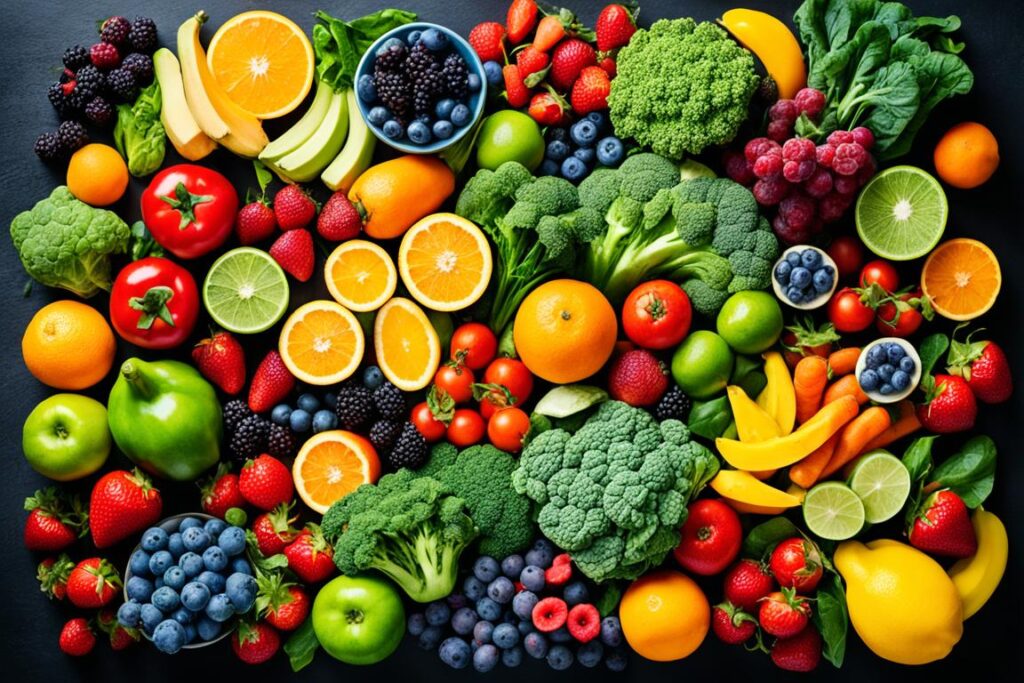Ever noticed how to increase metabolism, some people never seem to get tired and keep slim easily? Knowing how our body uses food for energy is crucial. It helps us stay active and manage our weight better.
Metabolism turns the food and drinks we consume into energy. This energy is used for everything we do. Factors like age, eating habits, body makeup, and exercise impact how well our metabolism works. Luckily, we can naturally boost our metabolism to feel and perform better.
Eating more protein can make our bodies use more energy to digest it. Adding quick but intense workouts to your routine can also speed up your metabolism. Drinking green tea or coffee might up your energy use a bit, and sleeping well can keep your blood sugar levels stable. This boosts your metabolism. Making these changes can help you keep your energy up or lose weight if you want to.
Key Takeaways
- Eating more protein can increase the amount of energy burned during digestion.
- Highly processed foods can contribute to weight gain due to their low energy requirements for digestion.
- Drinking coffee or green tea can help with slight increases in energy expenditure.
- Engaging in high-intensity interval training (HIIT) and strength training can boost your metabolic rate.
- A good night’s sleep is essential for metabolic health and weight management.
The Science Behind Metabolism
Metabolism turns food into energy. It’s complex but crucial for life. Let’s explore how it works and what affects it.
Understanding Basal Metabolic Rate
Your basal metabolic rate (BMR) is the calories you burn at rest. It makes up 60-70% of daily energy use. Muscle mass boosts your BMR since muscles use more energy than fat.
Age, sex, and body size also affect your metabolism. Regular strength training keeps muscles strong. This helps keep your BMR high, even as you get older.
Factors Influencing Metabolism
Many things can change how fast you burn calories. For example, sleeping enough prevents fat buildup and raises metabolism. Diet is key; eating too little slows metabolism, while healthy foods and water boost it.
Walking 25-30 minutes a day, five days a week, or doing intense exercises like running boosts energy use. Caffeine can also slightly increase your BMR in the short term.
Anabolism vs. Catabolism
Metabolism includes anabolism and catabolism. Anabolism stores energy, building small molecules into bigger ones. This helps grow and repair tissues. Catabolism breaks down molecules, releasing energy for fuel and activities. Balancing both is key for a healthy metabolism.
Metabolism-Boosting Foods

Adding foods that boost your metabolism to your diet is key to improving your metabolic rate and staying healthy. These foods help increase your body’s heat production, raise your body temperature, and give you important nutrients. Let’s look at some of the top choices.
Protein-Rich Foods
Protein is vital for metabolism because it makes your body work harder to digest food. Choices like lean chicken and turkey, beans such as black beans and lentils, and omega-3 rich fish are great. The American Heart Association suggests eating fatty fish twice a week for a better metabolism.
Also, dairy items like low-fat milk and cottage cheese are good for your muscles and health. They provide calcium and vitamin D.
Spicy Foods and Capsaicin
Spicy foods that have capsaicin can speed up your metabolism by making your body warmer. Capsaicin is in chili peppers and helps your body burn calories faster. Adding spicy foods to your meals can help with burning more calories and managing your weight.
Green Tea and Oolong Tea
Green tea is famous for its ability to boost metabolism. Both green tea and oolong tea help break down fats into free fatty acids. Drinking these teas can up your metabolic rate as part of a healthy lifestyle.
Their positive effects on the gut also help with metabolism.
Overall, eating different foods that boost your metabolism can help you use more energy and manage your weight better. Eat plenty of protein, add some spicy foods to your diet, and drink green or oolong tea for the best results.
Effective Exercises to Boost Metabolism
Adding the right exercises to your routine can really speed up your metabolism. High-intensity interval training (HIIT) and strength training are great for this. They don’t just burn calories but also make your body leaner and help you lose fat.
High-Intensity Interval Training (HIIT)
HIIT workouts mix short, intense activities with periods of rest. They’re great at making your metabolism faster. Researchers have found HIIT significantly improves your VO2max and keeps metabolism high for hours after you’re done. You burn calories quickly during the intense parts, and the effect continues for a while.
Research shows HIIT is three times better than long, slow workouts at boosting VO2max. Also, since men have more muscle mass, they usually burn calories faster. HIIT helps everyone preserve muscle and lose fat, making it a great choice for all.
Strength Training and Weight Lifting
Lifting weights is key for a balanced fitness plan. It builds muscle, which uses more calories than fat, even when you’re not moving. For example, 10 pounds of muscle use 50 calories a day just sitting there, but fat uses less. This shows how important muscle is for keeping your metabolism high.
Strength training can raise your metabolism for days after a workout. The more muscle you have, the more calories you burn, even while relaxing. Exercises like squats, push-ups, and lifting weights make your muscles stronger and speed up your metabolism. This helps you keep the fat off and get fitter overall.
Healthy Lifestyle Habits to Increase Metabolism

Living healthy boosts your metabolism. Eating regular meals and snacks keeps your energy up. It can help manage your weight.
It’s important to eat enough calories. Women 19-30 need 1,600–2,400 daily, men need more based on activity. Pregnant or nursing women need extra calories for their health.
Eating protein helps burn more energy than fats or carbs. A study showed high-protein diets increase energy burning. This helps with metabolism.
Drinking up to 8 cups of green tea daily has many benefits, including weight management. Water intake also boosts fat burning, studies say.
Building muscle helps speed up metabolism. Research links high muscle mass with better metabolic rates. Adding strength training can boost metabolism slightly.
High-Intensity Interval Training (HIIT) burns fat and energy after the workout. A 2021 study found it especially effective for young, fit women.
Getting at least 7 hours of sleep is crucial for metabolism, says the CDC. Too little sleep can slow it down and upset energy balance.
| Factor | Impact on Metabolism |
|---|---|
| Protein Intake | Increases metabolic rate by 20-30% |
| Muscle Mass | Higher muscle mass leads to higher metabolism |
| Hydration | Enhanced fat oxidation |
| HIIT | Burns more calories post-exercise |
| Sleep | Affects metabolic rate and energy balance |
Combining healthy habits boosts your metabolism. Regular meals, enough water, and exercise improve your well-being. It creates a strong basis for metabolism health.
How to Increase Metabolism Through Sleep and Stress Management
Sleep plays a key role in metabolic health. Not getting enough sleep can slow down your metabolism. This also messes with hormones that control hunger. The National Sleep Foundation found that Americans are sleeping less over the years. This leads to not sleeping well. Also, a 2005 report showed more adults only get about 6 hours of sleep nightly since 1985. This change harms our metabolic health.
The Impact of Sleep on Metabolism
Sleep loss badly affects our metabolism. Research shows it messes with our hormones. For example, a study found that men sleeping only 4 hours had changes in hunger hormones. This made them feel hungrier. Another point is that lack of sleep makes us eat more snacks. This was found in a study by the American Journal of Clinical Nutrition in 2009. So, good sleep links closely to keeping a healthy metabolism.
Managing Stress for a Healthier Metabolism
Handling stress well is vital for a healthy metabolism. Long-term stress can increase cortisol, slowing metabolism. This might lead to bad eating habits. Daily mindfulness for 10 to 15 minutes can reduce cortisol. This helps you sleep better and keeps your metabolism healthy. Also, eating well and exercising regularly can fight stress’s bad effects. Adding these practices to your day can keep your metabolism steady and improve your health.
FAQ
Q: What is metabolism and why is it important?
Q: What are some natural ways to increase metabolism?
Q: How does sleep influence metabolism?
Q: Which foods are best for boosting metabolism?
Q: What is Basal Metabolic Rate (BMR) and how is it calculated?
Q: How do factors like age and muscle mass affect metabolism?
Q: What are the benefits of high-intensity interval training (HIIT) for metabolism?
Q: Can managing stress improve metabolism?
Q: Are there any supplements that can help boost metabolism?
Q: How does hydration play a role in metabolism?
Source Links
- https://zoe.com/learn/how-to-increase-metabolism
- https://www.forbes.com/health/weight-loss/how-to-increase-metabolism/
- https://www.houstonmethodist.org/blog/articles/2023/oct/how-to-boost-your-metabolism/
- https://www.rush.edu/news/how-metabolism-really-works
- https://cse.tcu.edu/stories/posts/davis-metabolism.php
- https://www.mayoclinic.org/healthy-lifestyle/weight-loss/in-depth/metabolism/art-20046508
- https://www.unitypoint.org/news-and-articles/12-metabolism-boosting-foods-to-aid-weight-loss
- https://www.healthline.com/nutrition/metabolism-boosting-foods
- https://www.webmd.com/diet/ss/slideshow-foods-to-eat-that-help-your-metabolism
- https://eattrek.com/blog/exercises-to-boost-metabolism/
- https://egym.com/us/blog/boost-metabolism
- https://www.everydayhealth.com/healthy-living/fitness/7-ways-speed-up-your-metabolism/
- https://www.medicalnewstoday.com/articles/323328
- https://www.healthline.com/nutrition/10-ways-to-boost-metabolism
- https://www.webmd.com/fitness-exercise/what-is-metabolism
- https://www.ncbi.nlm.nih.gov/pmc/articles/PMC2929498/
- https://www.healthline.com/health/how to increase metabolism
- https://www.sleepfoundation.org/physical-health/weight-loss-and-sleep